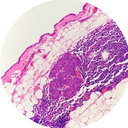Picomolar dichotomous activity of gnidimacrin against HIV-1.
Parole chiave
Astratto
Highly active antiretroviral therapy (HAART) has offered a promising approach for controlling HIV-1 replication in infected individuals. However, with HARRT, HIV-1 is suppressed rather than eradicated due to persistence of HIV-1 in latent viral reservoirs. Thus, purging the virus from latent reservoirs is an important strategy toward eradicating HIV-1 infection. In this study, we discovered that the daphnane diterpene gnidimacrin, which was previously reported to have potent anti-cancer cell activity, activated HIV-1 replication and killed persistently-infected cells at picomolar concentrations. In addition to its potential to purge HIV-1 from latently infected cells, gnidimacrin potently inhibited a panel of HIV-1 R5 virus infection of peripheral blood mononuclear cells (PBMCs) at an average concentration lower than 10 pM. In contrast, gnidimacrin only partially inhibited HIV-1 ×4 virus infection of PBMCs. The strong anti-HIV-1 R5 virus activity of gnidimacrin was correlated with its effect on down-regulation of the HIV-1 coreceptor CCR5. The anti-R5 virus activity of gnidimacrin was completely abrogated by a selective protein kinase C beta inhibitor enzastaurin, which suggests that protein kinase C beta plays a key role in the potent anti-HIV-1 activity of gnidimacrin in PBMCs. In summary, these results suggest that gnidimacrin could activate latent HIV-1, specifically kill HIV-1 persistently infected cells, and inhibit R5 viruses at picomolar concentrations.




